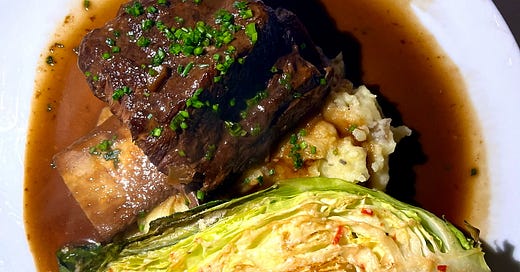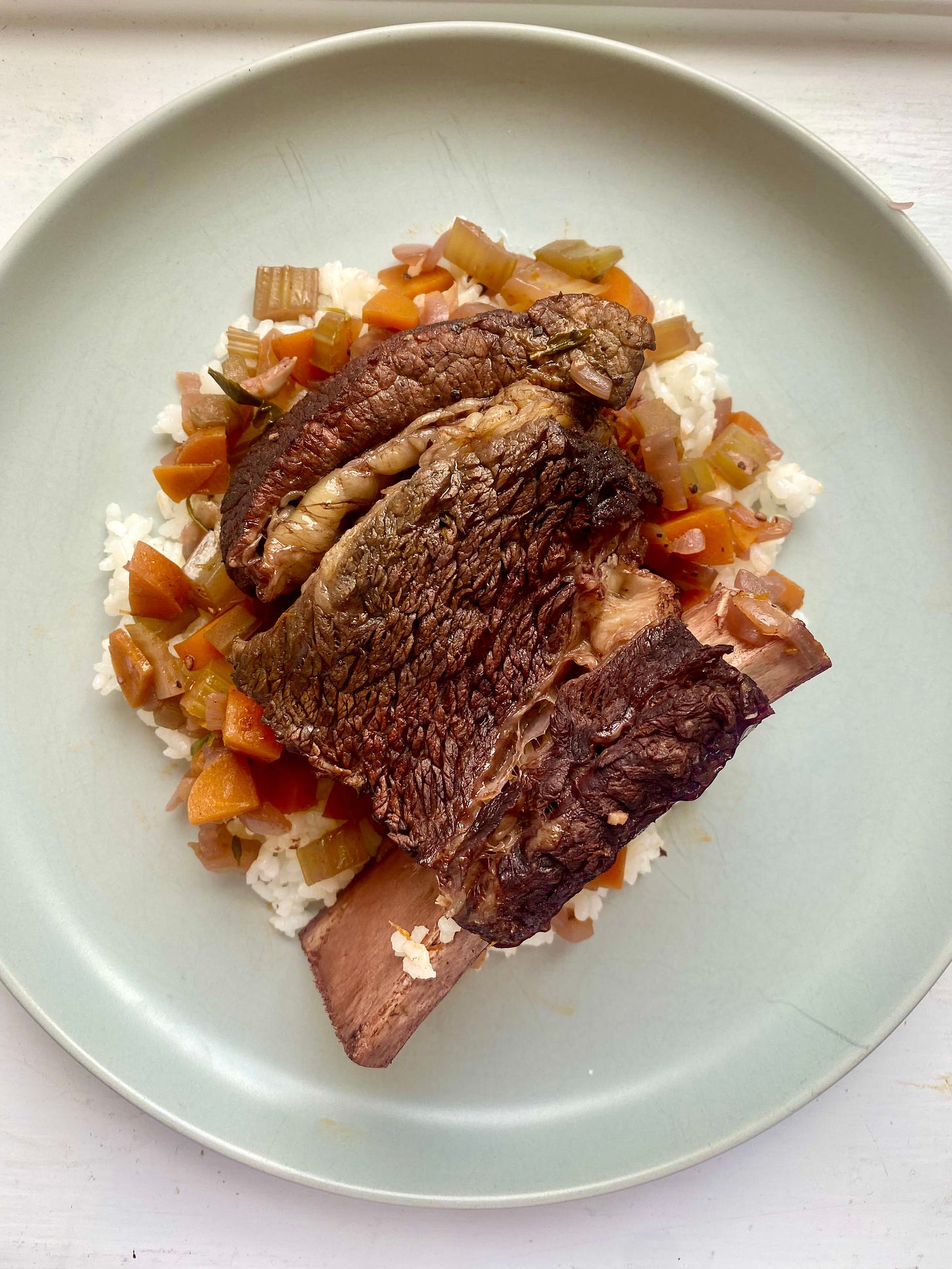When I fail, my first response is pure frustration. I get disheartened, I feel I've lost, and I crash. It's not second nature for me to pick up the pieces, figure out what's salvageable, and eventually try again.
Cooking is not easy, but it is second nature. So, when I fail, it can be hard to cut myself some slack and figure it out. Today, I attempted to develop a recipe with one of my favorite cuts of meat: short rib. I went to the butcher, bought a kilo of meat, chose a bottle of wine, put on my apron, got my notebook, and started at a recipe that was probably out of my depth. I was embarking on an attempt at a revered classic without doing nearly enough research on the rigid lines of French cooking; I was virtually defenseless. After a few hours, pictures taken, and notes in the air that really promised me something special, I cut into a dry slab of high expectations. As quickly as the beautiful smell of something I had created filled the kitchen, so did my obsessive and frustrated critiques of myself and my ability. Even the sight of a singular nat hovering over the table sent me spiraling. Set traps. Clean the whole kitchen. Mop the floors. Don't leave a trace. I couldn’t acknowledge that the sauce was actually superb, nor could I think about what a great steak sandwich it would contribute to tomorrow. I couldn’t say that it was a great start for a shot in the dark… I could only attempt erasure and engage in silent disapproval for the hands who inflicted it.
Picking myself up after failure and trying again is not second nature, no, but it's life. It’s not something that comes easy, and it is not my first response when I fall short. But it is necessary, something that I have to and will continue having to teach myself to do as I continue to fail and reassemble the pieces of a recipe or the pieces of life. The short rib is a pillar of this. It is my favorite. I held high expectations for my ability and the end result, but five hours later, when I sat down, it wasn't what I wanted it to be… but it was a start. Sometimes, frustration can be used as a sort of fuel.
What can I do to improve this? Where did I go wrong? What could I have done differently? What can I do to ensure this doesn't happen again? Newsflash, it will happen again. And again. And again. Cooking is as trivial as anything else one may encounter. No takebacks, only trial and error. So, eventually, I will do it again. I will go to the butcher and buy another bottle of red wine and do the extra research so that I might have a chance of putting a plate together that is exactly what I saw, smelled, and tasted when I closed my eyes and asked myself what I wanted to do next. What’s more, these ‘failures’ and those that will inevitably follow are not a series of screw-ups but a series of reactions to error. These slips only get me closer to understanding what makes something great and how to strive for better. There are no erasures or takebacks on this one, just notes and improvements (hence the immortalization of the instance on this page). Eventually, I will make another imperfect short rib, and another one after that, and after each attempt, it will only get closer to gold.
I wrote the above passage to process the obvious feelings of defeat that I experienced following my attempt at one of the greats. That was July 21, 2023. On February 6, 2024 I tried again. I researched, I planned, I developed my own side dishes, and I found short rib recipes online that guided my steps. No, it was not the best short rib on the face of the Earth, but it was a (huge) step closer compared to the last one - plus, the faces around the table seemed pretty pleased (university students getting fed braised short ribs with red wine sauce, rosemary infused mashed potatoes and roast cabbage… shocker). So here I present to you a series of adjustments and an instance where cooking (and failing) provided me with much more than just food. A grade A (peer-reviewed) warm plate for the soul.
Short Ribs
Ingredients
Neutral oil
Salt and pepper
1-2 kilos of Beef Short Ribs
6 garlic cloves
1-2 cups of carrots
1-2 cups of celery
1 white onion
Worcestershire sauce
2-3 tbsp tomato paste
2 cups dry red wine, I used Merlot
8 cups of beef broth
3 bay leaves
Rosemary
Thyme
Chives (for garnish)
Procedure
Preheat the oven to 160C
Season short ribs generously with salt, set aside
Chop carrots, celery, and white onion into similar sizes and set aside
To a large dutch oven heat oil on medium/high heat until very hot. Add your beef shortribs (work in batches so to not overcrowd the pan) and sear on all side 3-5 minutes each. Remove to a plate when they have a very nice gold color.
To the same pot add your vegetables and cook for 10-15 minutes until pretty soft. Then, add your garlic (minced) and cook until very fragrant.
Add tomato paste and worcesershire sauce and cook for about 4 minutes, stirring to incorporate.
Deglaze with red wine (about 2 cups but more doesnt hurt), scraping the bottom of the pan to lift any bits of ‘burnt’. Bring to a boil then reduce to low, let simmer for roughly 10 minutes or the wine has thickened and reduced.
Add beef broth and bring to a simmer, add beef back to the pot and introduce all herbs. Cover and bring to the oven for at least 3 hours. Mine were in for about 3 hours and 45 minutes, I checked on them every hour or so and removed them when I noticed the meat visibly and easily pealing away from or falling off the bone and the meat was very soft (fork tender).
Remove the beef and strain the liquid into a sauce pan. Bring that liquid to a gentle simmer for about 20 minutes, or until it is at your desired thickness… I like mine a bit thick.
Return the beef back to the sauce to warm then assemble the plates. Serve over mashed potatos, with the roast cabbage and topped with extra sauce and fresh chives.
Roasted Cabbage
Ingredients
Olive oil
Butter
Cabbage, cut into 4 wedges
Garlic
Birds eye chilis
Lemon
Parmesan
Procedure
Preheat the oven to 230C
In a skillet on medium/high heat, heat olive oil and a bit of butter. Once hot, add your cabbage wedges (they should sizzle, if they don't the pan is too cold) and sear each flat side until dark and golden. If possible, use a weight or a pan lid to get an even sear. It should take about 2-3 minutes on each side.
Make the compound butter: to a bowl, add the juice of one lemon, two birds eye chilis, deseeded and minced, a good handful of parmesan, and three garlic cloves minced to a paste. Mix in very soft butter until fully combined. Adjust for flavor and season.
Once seared, brush the cabbage with a generous amount of the compound butter.
Bring to the oven for about 20-30 minutes, flipping half way through.
Serve topped with more parm.
Mashed Potatoes
Ingredients
Potatoes
Butter
Milk
Whole black peppercorns
Rosemary
Garlic
Chives
Procedure
Cut your potatoes into similar chunks. I keep the skin on but peel if you don't like skin!
Boil potatos in heavily salted water until the potatoes are falling apart on a fork. Drain and mash.
With a mortar and pestle, crush salt, black peppercorns, rosemary (dry or fresh), and two garlic cloves.
Add a heaping spoonful of butter to your mashed potatoes and mix until melted, then slowly add milk until you've reached your desired texture. Add the seasoning little by little, tasting to ensure that it does not become overpowering. Mix in finely chopped chives at the very end.
Serve!








"Great plays aren't written, they are re-written." Tennessee Williams.
(the writer's answer to your short ribs)
Thanks for the glimpse into the process.